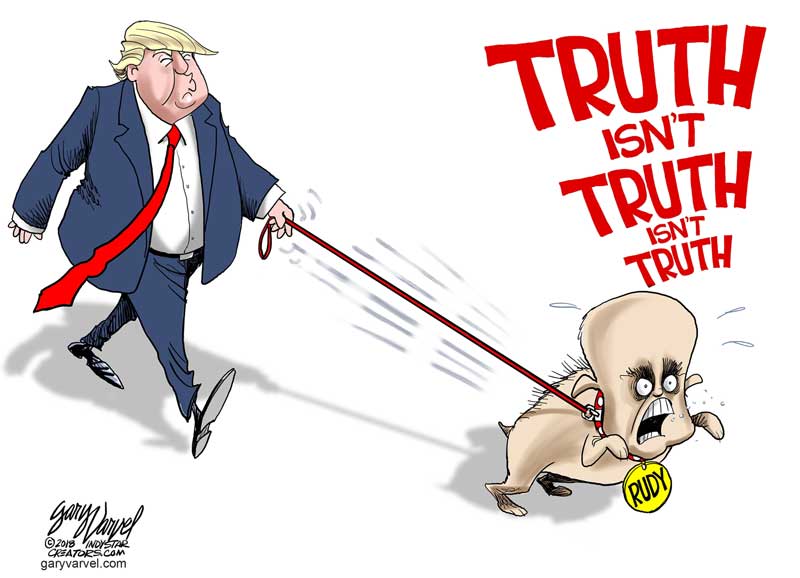
“Truth isn’t truth.” Last Sunday, Aug. 19, 2018, on NBC’s “Meet the Press,” moderated by Chuck Todd, President Donald Trump’s personal lawyer Rudy Giuliani explained clearly why the “truth isn’t truth!” (For those that want to see this new episode from the series of alternative truths, the link is https://www.nbcnews.com/meet-the-press/video/giuliani-truth-isn-t-truth-1302113347986?v=railb.) On the one hand, Giuliani’s statement on NBC came after other reflections days prior to the NBC interview, when he stated “philosophically” that “the truth is relative.” On the other hand, one should not overlook the general context of Trump’s presidency. In January 2017, I was already writing in this newspaper about the shocking expression “alternative truths” used by Trump’s communications adviser, Kellyanne Conway, to justify her boss’s fanciful claims about the number of attendees at his inauguration ceremony.
If you look at Giuliani’s past, his relativism about truth stops seeming so extravagant, because Giuliani has always migrated politically, American style. Born in 1944, he began his political career with the Democrats in the 1970s, then, after a transition as an independent, shifted allegiance to the Republicans in the 1980s, when he earned a reputation of being a tough prosecutor and served two terms as mayor of New York. In 1981, after Ronald Reagan was elected president, he joined the Republicans and served as United States associate attorney general, the third-highest position in the Department of Justice. He became known for his controversial positions, such as the time in 1982 when he claimed to support the internment of 2,000 Haitian asylum seekers, whom he defined in pleadings during the Reagan administration’s case as “economic migrants,” not refugees. He claimed that political repression, at least in the general sense, did not exist under Jean-Claude Duvalier’s regime. Four years later, in 1986, Duvalier fled Haiti in a U.S. Air Force plane following a popular revolt.
The 9/11 attacks, which made him famous worldwide, found him in the last months of his final term as mayor of New York, where he was first elected in 1993. Before becoming one of Trump’s lawyers last spring in the Russian interference case, Giuliani was one of John McCain’s opponents in the 2008 presidential primary elections. Sen. McCain, 81, died last Saturday. But what a great political contrast can be seen in a Vietnam hero and a steadfast politician who, at the end of his life, had the courage as a Republican to face Trump and Giuliani. It is no surprise that Giuliani affirmed without hesitation that “truth isn’t truth.”
After the absurd NBC interview, Giuliani clarified, on Twitter, of course, how he tried to explain that people can offer different versions of the same event. Everyone has his version of the truth. In the NBC interview, Giuliani was trying to explain why it would be a mistake to bring President Trump in front of Special Counsel Robert Mueller, because Trump risks committing perjury, and, in any case, the truth is relative: Trump’s truth and Mueller’s truth could be at odds with each other but no less plausible. Using the same logic a week ago in the context of his boss’s legal difficulties, Giuliani said that facts are just a “matter of perception.” In May, speaking about Jared Kushner on CNN and comparing him to his wife and Trump’s daughter, Ivanka, Giuliani said that “men are, you know, disposable. But a fine woman like Ivanka? Come on.”
Returning to Romania, it is the same situation with Judge Tudorel Toader, for whom the truth is relative. As an example, in order to make the assessment of General Prosecutor Augustin Lazar credible, a protocol was revealed justifying a new political procedure that puts the Public Ministry at the disposal of politicians. However, there is a difference between America and Romania: in America the rule of law is still resilient.

Leave a Reply
You must be logged in to post a comment.